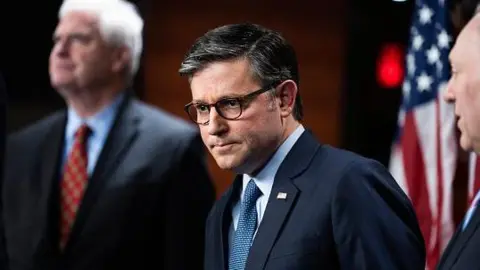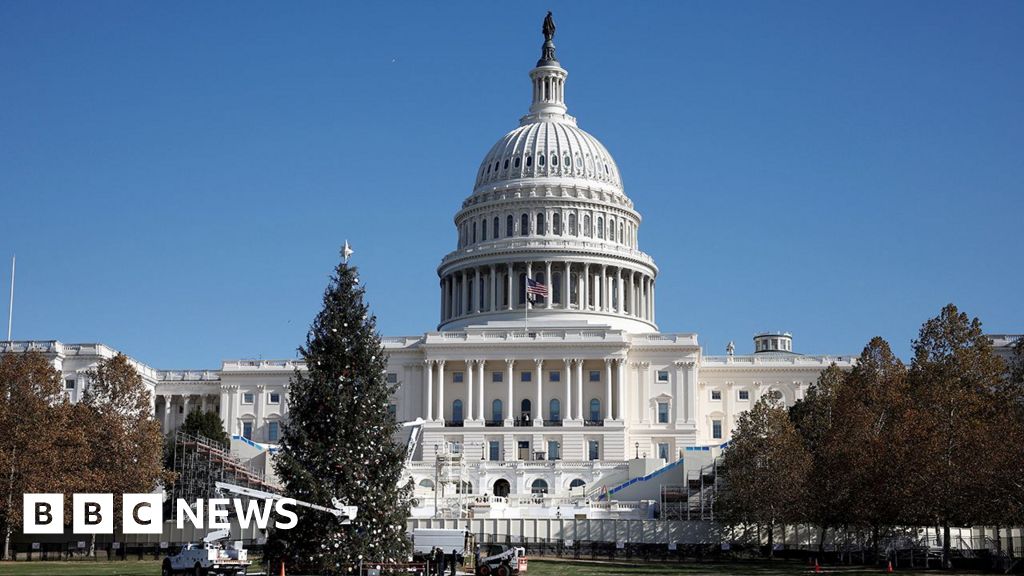 Getty Images
Getty ImagesA US government shutdown is fast approaching after the House of Representatives voted against a Donald Trump-backed spending bill.
Dozens of Republicans defied the president-elect by joining Democrats to reject a revised funding measure.
If no deal is agreed by midnight local time on Friday, some federal services will begin shutting down from the early hours.
The Republican Party’s leadership in the House vowed to find a solution to the impasse over government funding ahead of the deadline.
Unlike in much of the rest of the world, government shutdowns in the US happen relatively often due to a 1980 act which basically ruled that without a budget there can be no spending.
This means that if the US Congress – made up of the House of Representatives and the Senate – does not approve a budget, there is no money for the federal government and non-essential services soon begin shutting down and many public employees stop getting paid.
Services classed as essential – mostly related to public safety – continue to operate, and those workers are required to show up without pay.
That usually includes border protection, hospital care, air traffic control, law enforcement, and power grid maintenance.
Services deemed to be non-essential, such as the food assistance programme, federally funded pre-school, the issuing of student loans and food inspections, and the opening of national parks, will all be hit.
The latest spending plan was the second in as many days which failed to reach the two-thirds majority needed to pass the lower chamber of Congress, with 38 Republicans voting against the bill on Thursday night.
This was in defiance of Trump who the day before had thwarted a previous cross-party funding deal that the Republican House leadership had struck with Democrats, after heavy criticism of the measure by tech billionaire Elon Musk.
The Tesla founder, who Trump has tasked with identifying spending cuts by co-leading the Department of Government Efficiency (which is not an official government department), lobbied heavily against the existing deal with dozens of posts on X – the social media platform he owns.
He called it “criminal” and often referenced false statements about the bill in his posts
Musk wrote on X that any lawmaker “who votes for this outrageous spending bill deserves to be voted out in 2 years”.
After Musk drummed up opposition for the spending bill, Trump and the incoming vice-president JD Vance dealt the final blow to Republican House Speaker Mike Johnson’s deal on Wednesday evening.
They said in a joint statement they wanted streamlined legislation without the Democratic-backed provisions that Johnson had included.
They also called for Congress to raise or eliminate the debt ceiling, which determines how much the government can borrow to pay its bills, and limit the funding legislation to temporary spending and disaster relief.
They called anything else “a betrayal of our country”.
 Reuters
ReutersAfter the initial bill failed by 174 votes to 235, Johnson said he would come up with another solution before government funding lapses at midnight on Friday.
The House then voted on this revised edition on Thursday which included some concessions to Trump’s demands, but Republican rebels objected because they opposed increases in government spending, while Democrats voted against it because they said the extra borrowing would be used to give tax cuts to the wealthy.
The current deadlock can be traced back to September, when another budget deadline loomed.
Johnson failed to pass a six-month funding extension as Democrats voted against because it included a measure (the SAVE Act) to require proof of citizenship for voting.
Instead, Congress came to a bipartisan deal for a bare-bones bill that would keep the government funded until the end of 20 December.
It is not clear what will happen next.
Lawmakers are expected to return on Friday morning, with less than 24 hours on the clock until a looming shutdown.
And while the bill will need support from both sides of the chamber to pass, the partisan blame game is in full swing. After the Thursday bill was shot down, Johnson told reporters it was “very disappointing” that almost every House Democrat had voted against it.
Yet Democrats are unlikely to help Johnson with support for a revamped funding bill, blaming him for breaking their bipartisan agreement.
And others seemed to taunt Republicans for seeming to take their direction from the unelected Musk.
On the House floor on Thursday, Connecticut Representative Rosa DeLauro – the top Democratic appropriator in the House – called the billionaire “President Musk”, to laughter from fellow Democrats.
The situation also poses a challenge for Johnson, as the House is set to vote in just 15 days on who will serve as House Speaker for the next Congress.
What previously looked like a secure position for Johnson is now seeming less of a sure thing.
And it’s not only Johnson who is in a tricky situation – this was the first big test of Trump’s influence over current congressional Republicans, and in the vote on Thursday, a number of them baulked.
The last government shutdown ran from 21 December 2018 to 25 January 2019 and was the longest on record. The Congressional Budget Office (CBO) estimated that it reduced economic output, external by about $11bn, including $3bn that it never regained.



